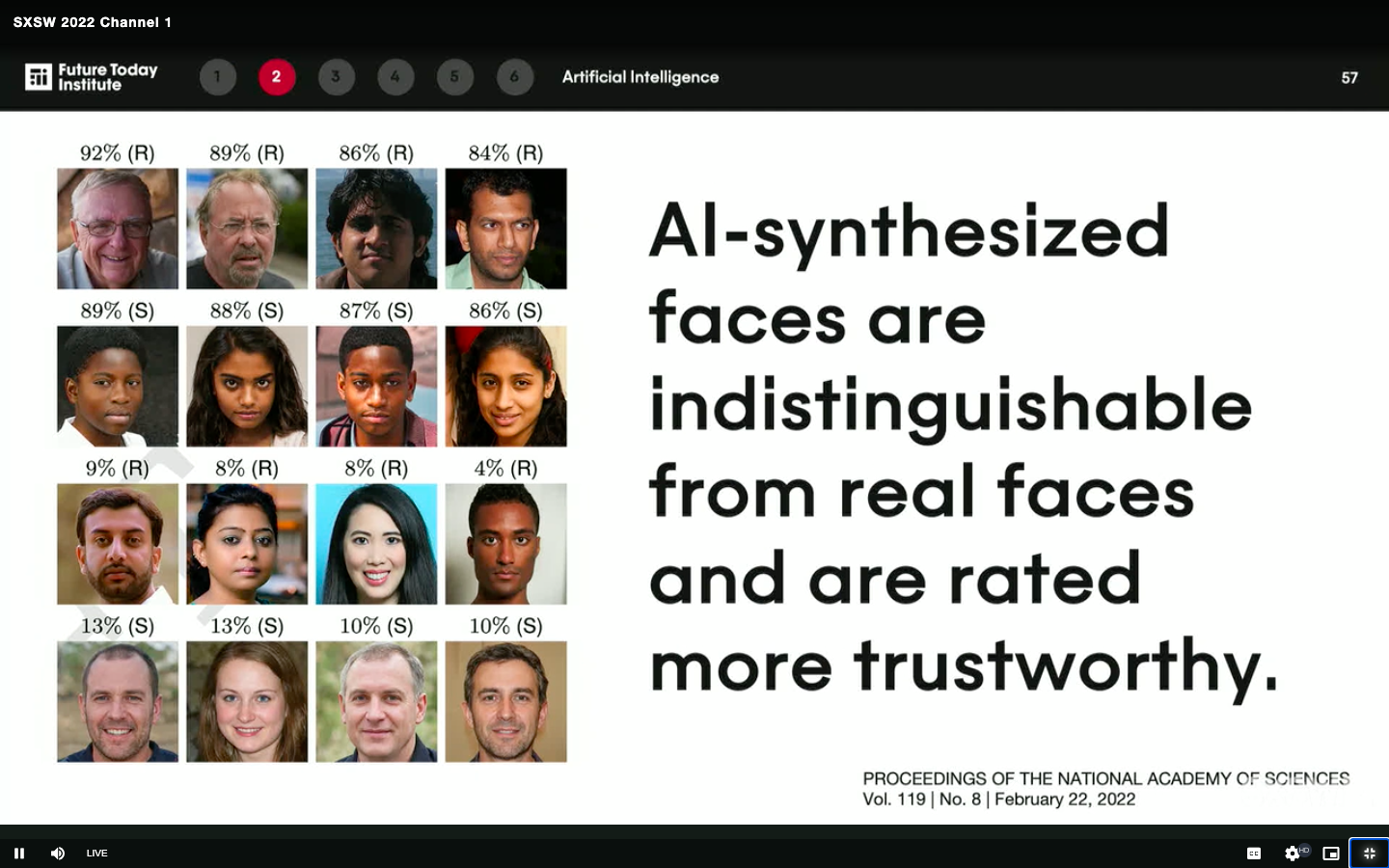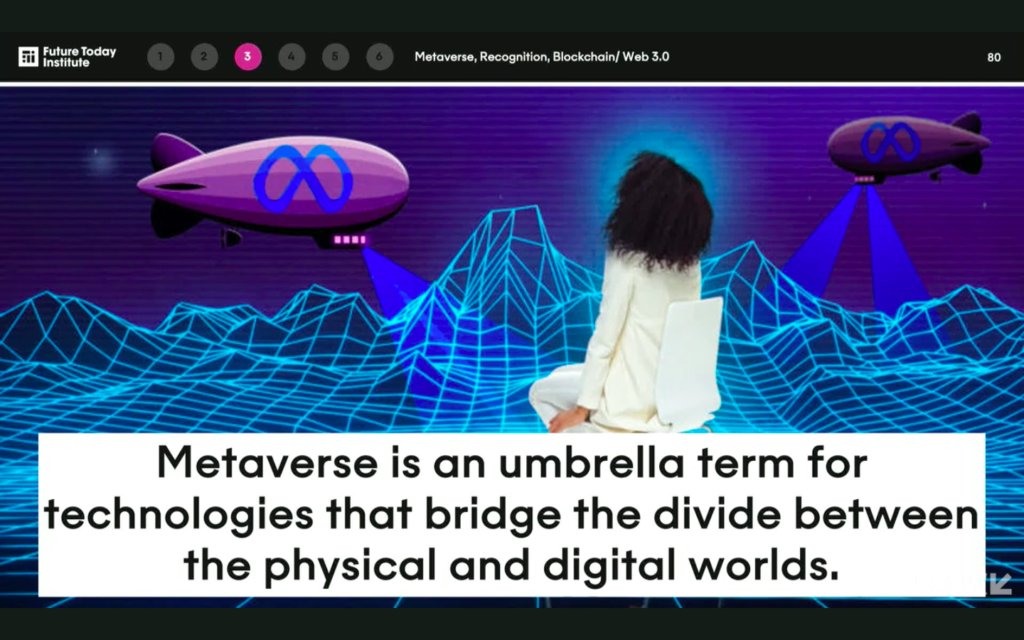
Digital identity in the metaverse, robots that are smarter than humans, synthetic biology to create chicken from stem cells, and climate change are some of the major trends Futurist Amy Web discussed at South by Southwest on Sunday morning
This year, Webb’s 15th annual trend report is 668 pages long and covers 574 longitudinal tech and science trends, and is divided up into 14 reports. But the trends alone are not enough, Webb said.
“You need to use trends to help you re-perceive the future,” Webb said. “To help you influence the future.”
The biggest problem facing the world right now is not creating Web3, the Metaverse, or AI Robots taking over the planet, Webb said. The biggest threat has to do with a climate emergency, she said.
“Already, earth has warmed by about 1 degree Celsius or 1.8 degrees Fahrenheit, since the 19th century, before industry started to boom,” according to the Environmental Defense Fund. “While we experience the effects, we’re on our way toward 1.5 degrees Celsius or 2.7 degrees Fahrenheit by as early as 2030.”
Rising temperatures are leading to extreme weather events worldwide. And if the world hits the 2-degree Celsius benchmark, those weather events will become even worse, Webb said.
“We’re not making enough changes,” Webb said. “We’re not doing enough about it. We’re not taking any action.”
It’s not enough to know the data, Webb said. People need to take actions right now to change behavior so that the future outcomes will be better, she said.
In addition to climate change, the major trends Webb talked about focused on Artificial Intelligence, Web 3, the Metaverse, and Blockchain and Synthetic Biology.
AI advancements are moving fast, Webb said. In 2012, a neural network taught itself how to recognize a cat. Today, those networks can generate cat clones that look identical to the real thing in a matter of seconds.
Image recognition and generation are seamless today, she said.
AI is reaching other benchmarks like figuring out how to beat humans at complex computer games, Webb said. Google’s DeepMind created an AI Agent 57 that beats humans at classic Atari games. More recently, an AI Agent named GT Sophy beat some of the world’s best drivers of PlayStation racing simulation game, Gran Turismo Sport.
“We’re getting closer to the day when AI networks do make their own decisions without a human in the loop,” Webb said. “And if that has you freaked out, you are not the only one.”
“AI is starting to change how we communicate,” Webb said. “They can determine what we mean, not just what we say.”
Webb showed an example of an AI-generated synopsis of her report. She gave the AI agent a prompt with instructions, and it wrote the summary on its own from her data.
“We are generating data that can be mined and refined by AI systems,” Webb said.
And it’s not just about facial recognition anymore. AI can recognize people by their breathing patterns or heartbeat.
“If you don’t want to be recognized, it’s not like you can stop breathing or have your heartbeat stop,” she said. “AI systems don’t need your face to see you and know who you are.”

The scary thing is people trust AI-generated faces, more than they trust real faces, Webb said. AI can pull all the characteristics of trustworthiness, friendliness and create faces that don’t exist, she said.
Next, Webb talked about the next generation of the Internet called Web 3. It is real and it is very important, she said. But digital collectibles, called Non-Fungible Tokens, are not the long-term play, she said.

“The next version of the Internet will become more embodied,” she said.
The metaverse is part of Web 3, the next version of the Internet, Webb said. The problem is there are no common protocols for the metaverse right now, she said.
“If you think managing passwords is a challenge today, imagine having to manage different synthetic versions of yourself sprinkled all over the metaverse,” Webb said.
Eventually, everyone will all have a digital ID, she said.
In the Metaverse, a digital ID is like a driver’s license, but it controls your data and you’re in charge of it and you’ll be able to parcel out different versions of your data as you see fit, Webb said.
Already, a Canadian-based company called Secure Key is creating digital IDs to protect data and information and give consumers pseudo-anonymity in the Metaverse, she said.
The buzz around NFTs will begin to fade, Webb said. Digital collectibles are valuable because of scarcity, but now the market is saturated with them, she said. But for now, the hype is real. Someone recently paid $650,000 for an NFT of a yacht in Sandbox.
“The analogy to fine art doesn’t mesh,” Webb said.

Webb also cautioned people to beware when they enter the Metaverse because they are much more vulnerable to influences. That is why regulation is needed, she said. Web3 is about transparency, interoperability, and trust, she said. But there need to be regulators to make sure that the virtual world develops in a healthy manner, Webb said.
Lastly, Webb talked about advances in synthetic biology like making chicken from stem cells. Lab-grown chicken is already being sold and consumed in Singapore.
The same big tech companies, Microsoft, Google, and Facebook, are working on synthetic biology applications, Webb said.
There are many products being made from DNA. Microchips are being made with DNA that can be used to reprogram the body and for life extension.
China owns most of the DNA in the world. The second and third biggest owners are Ancestry.com and 23andMe, Webb said.
The key takeaways from Webb’s talk are “we’re in a period of acceleration,” Webb said.
“Bias still persists, and we need to fix that,” she said. “Decentralization will benefit some, but not all. We don’t have guardrails or national plans.”
And lastly, “we will need to define what is “real,” Webb said.

